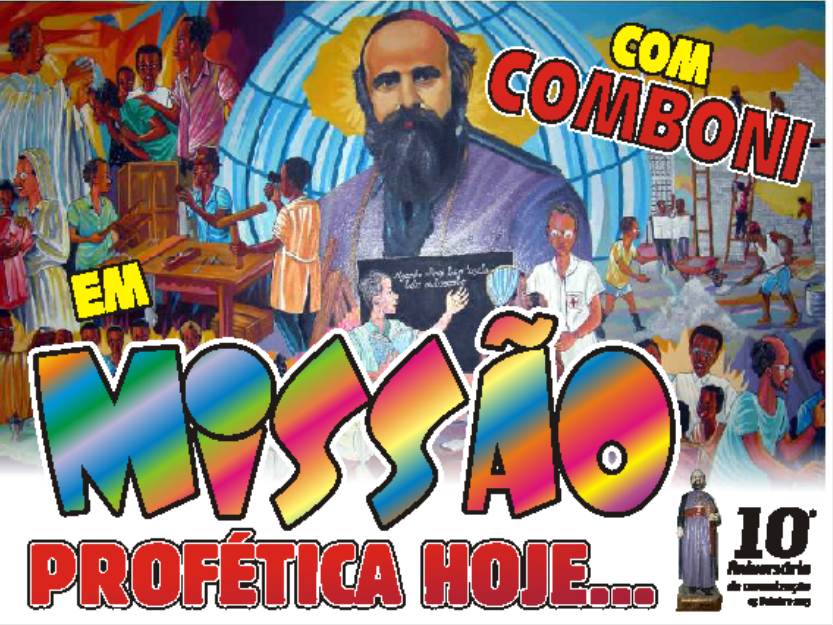Daniel Comboni
Comboni Missionaries
Institutional area
Other links
Newsletter
Saturday, September 14, 2013
The yearly assembly of the Comboni Missionaries working in Portugal took place in Viseu on September 6-10. Its objective was to prepare the Missionary pastoral plan for next year, in the context of the 10th anniversary of the canonization of St. Daniel Comboni. In the picture: “With Comboni, on a prophetic mission today.”
The meeting which, besides the Comboni Missionaries, also saw the presence of other members of the Comboni family – novices, sisters, secular and lay missionaries and representatives of various lay groups – took place at our Mission Seminary, which is the first Comboni house in Portugal recently renewed in order to house sick and elderly confreres.
The theme chosen for the assembly and for all of next year’s activities was “With Comboni, on a prophetic mission today.” In the light of this, the missionaries were invited to look at today’s forms of slavery as a challenge which cannot leave anyone indifferent and, because of this, needs a pastoral answer.
Fr. Arlindo Pinto, coordinator of the Justice, Peace and the Integrity of Creation JPIC) in the Institute said: “The cry and the suffering of many of our brothers and sisters, together with the multiple threats leveled against our planet, must be part of the agenda of evangelization and mission promotion of the Comboni Missionaries, wherever they happen to be.” Fr. Arlindo was invited to speak on “Comboni vision and mission in the face of the ancient and the new forms of slavery on the 10th anniversary of the canonization of St. Daniel Comboni,” with the objective of opening new horizons in the planning of missionary activities in Portugal.
Fr. Arlindo exhorted the participants to look at Comboni as an example of a missionary who “not only fought in defense of the African slaves and for their liberation from the hands of the salve traders, but who also did all he could for the abolition of those laws and structures that allowed this despicable trafficking of human beings.” Following in the same line, he highlighted the prophetic dimension of Comboni. He said: “Comboni took care of denouncing the proven facts to the highest Church and political levels, of the actual liberation of slaves and of their human, religious and professional formation. Therefore, he did not promote a spiritualistic, intimate or paternalistic type of evangelization, but a missionary activity bent on the effective and integral liberation of the human person and the abolition of the criminal organizations that were responsible for the slave trade.”
Joaquim Franco, a Portuguese journalist, was another invited speaker and he presented the topic of “New forms of slavery: open spaces challenging us to action.” Starting from the familiar context of a TV journalist, Joaquim pointed out some of the challenges to the mission of the Comboni Missionaries for the Church in Portugal and listed some of the forms of slavery: the cry of social and existential peripheries, the challenge of hospitality and the urgency of relations and affection; the internal illnesses of the Church, the various forms of dependence from the market, from communications and from consumerism and all types of self-reference. According to the journalist, the family should be the “top priority of the Christian mission” and solidarity the “attitude which educates against all forms of slavery.”
Those responsible for vocation and mission promotion offered some proposals for the pastoral year 2013-2014, among them the organization in each community of a celebration, to be held in October, centered around St. Daniel Comboni.
The secretary of mission promotion will produce audio-visual and informational material on the modern forms of slavery and on how Comboni fought against these evils of his own time.
All of the activities of the province and, in particular, the Comboni pilgrimage to Fatima, due to take place on July 26, 2014 will be centered on this prophetic dimension of Comboni and on his holiness.
In the course of the assembly there took place the last scrutiny for the election of the next provincial of Portugal. Fr. José da Silva Vieira, who is currently in South Sudan, obtained the most votes.







